En xarxa
6. Networking
Turning good ideas into real projects
UPF Starting Lab was created to help young creatives to make their final projects in the field of interactive communication a reality.
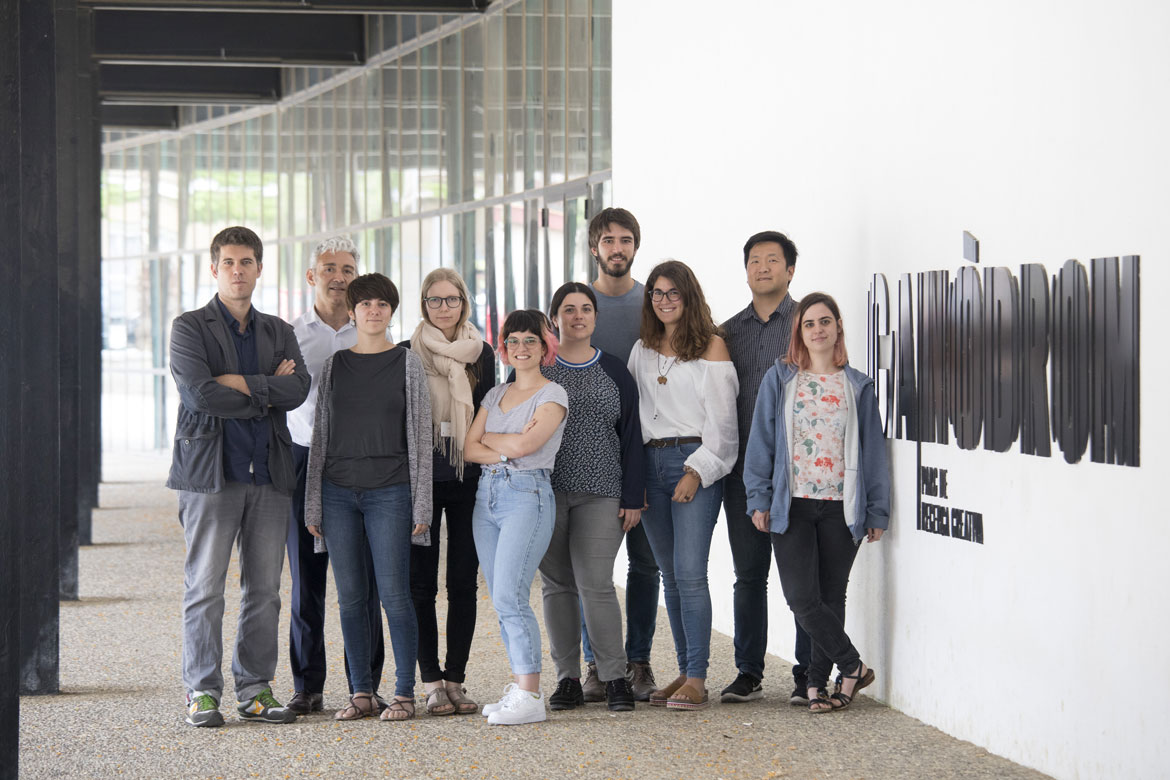
Members of the three projects from the first edition of UPF Starting Lab with the initiative’s promoters
UPF Starting Lab ‘aims to provide creative young people with an optimal learning and work platform to carry out highly innovative proposals in the digital audiovisual industry’, explained Carles Sora, a lecturer in the Department of Communication at UPF and the driving force behind the initiative. He added, ‘Not only does it seek to promote bachelor’s degree final projects, but also projects stemming from individual subjects or tutored by UPF researchers that promote new innovative formats.’
The second edition of the UPF Starting Lab programme is about to publish the call for submissions.
Launched in December 2016, the incubator is an initiative of the Audiovisual Communication programme at UPF in collaboration with Canòdrom – Creative Research Park. It also receives support from the Catalan Ministry of Culture via the Catalan government’s Catalan Institute of Cultural Companies (ICEC).
The project is a natural fit with the university’s Strategic Plan, as it emphasizes competencies, cultivates the relationship between teaching, research and knowledge transfer, and promotes interdisciplinarity. It also facilitates multidisciplinary work between different programmes at the university – enabling joint work by students from the bachelor’s degree programme in Audiovisual Communication, the Polytechnic School and the Faculty of Economic and Business Sciences – and fosters cooperation between alumni and undergraduate students.
The project is a natural fit with the university’s Strategic Plan, as it emphasizes competencies, cultivates the relationship between teaching, research and knowledge transfer, and promotes interdisciplinarity
Additionally, UPF Starting Lab is part of a more global strategic line promoted by the university and the Faculty of Communication: to enhance the relationship and reputation of its students with the business world and the city’s cultural institutions.
This poses a major challenge for universities, i.e. to support and nurture the relationship between student talent and the professional world in order to help students find jobs.
How does the programme work?
For the six months of the residency, the projects follow an incubation method coordinated by Canòdrom – Creative Research Park and designed in collaboration with the company Incubio.
The students have a work space where they receive professional advice ultimately aimed at turning a good idea on paper into a viable product for the market.
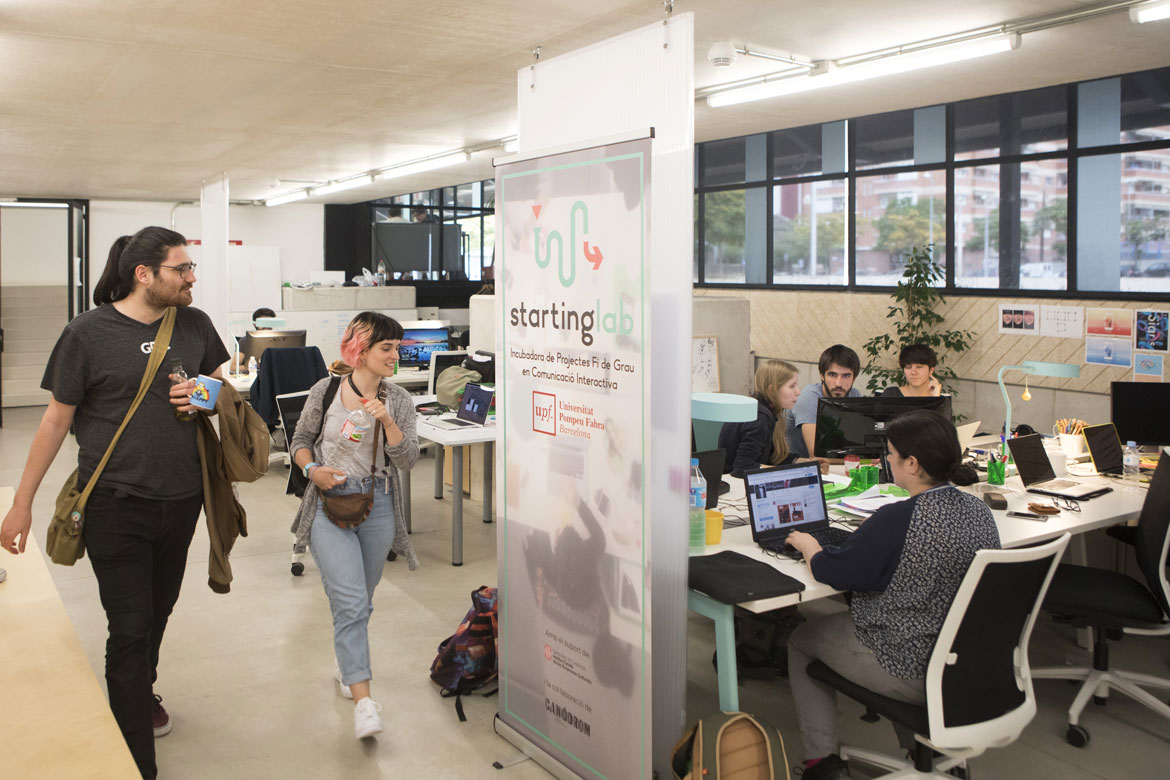
It begins with an assessment of the project’s status performed by an external professional linked to the field of the final-year project in question. Together with the programme’s directors, this person defines the goals to be met over the first three months of the incubation period.
Once the first stage is over, progress towards the goals is reviewed and assessed, and a second stage is designed, to last three more months applying the same follow-up method.
What are the main goals?
-
To orient bachelor’s degree final projects in Interactive Communication towards the professional audiovisual and digital innovation sector.
-
To equip students with greater professional resources to facilitate the subsequent circulation and evolution of their projects once the academic phase is over.
-
To provide a support stage for bachelor’s degree final projects in the UPF Faculty of Communication so that they can be carried out or channelled into a start-up.
-
To foster new cross-disciplinary integration experiences between teams from the Audiovisual Communication degree programmes, ICT engineering programmes, and degree programmes in Economics and Business at UPF.
The team of mentors and advisors from the first edition of the programme

Ramon Nafria
Video game producer and designer. He holds an engineering degree in Computer Systems from the Polytechnic University of Valencia (UPV). He is president of the Spanish Association of Digital & Interactive Entertainment Developers (DOID) and CEO of A Crowd of Monsters. He also writes for the magazine Videoshock.
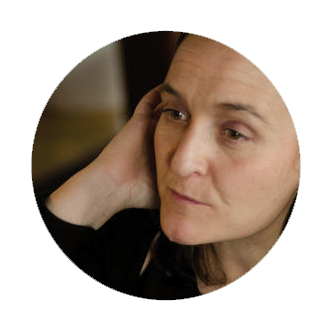
Tània Balló
Producer, film director and creator of the transmedia project Las SinSombrero. Co-founder of Intropia Media, a production company founded to meet the need to change the traditional approach to audiovisual production and online content so that it can be read through screens and digital platforms.

Simon Lee
Director of Canòdrom – Creative Research Park and manager and chief designer at Incubio. Creative designer specialized in the visualization, conceptualization and execution of new products and services with a solid technological background aimed at users.

Albert Roig
VP Engineering of Incubio since January 2014. A computer engineer by training, he has experience in project and team management and is responsible for helping to develop numerous start-ups using the proprietary Tech Lead Map methodology.

Alberto Ordieres
A professional computer engineer, he is driven by his passion for building things, from the most primitive and pure idea. After working in various industries, he learned to maintain strong and cohesive teams with the aim of successfully bringing off major projects. He coordinates the development of the UPF Starting Lab programme.
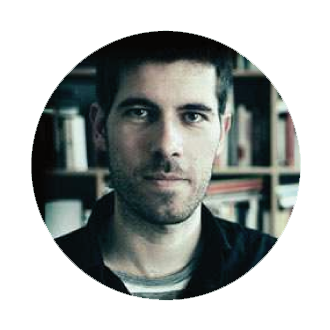
Carles Sora
PhD in Communication from UPF, researcher and designer of interactive and digital narratives. He is a lecturer on the bachelor’s degree programme in Audiovisual Communication at UPF and a member of the DigiDoc research group. Promoter and creator of the UPF Starting Lab programme.

Jordi Mendieta
President of the Audiovisual Cluster of Catalonia since 2016, manager of Moonbite Games, and managing partner of the film and television production company Dream Team Concept.
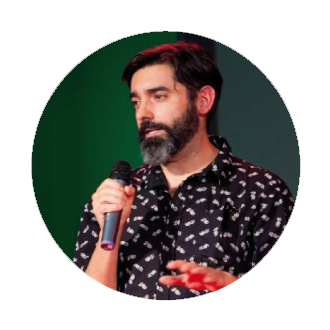
Carlos Fernández
Director, screenwriter and passionate designer of multiplatform video games and films. Executive director of the company Moonbite Games.

Andrés Manso
An innovation consultant, he has helped to create more than 30 start-ups and has advised more than 200 teams of entrepreneurs in the field of science. In 2011, he founded Incubio, the first business incubator in Barcelona, together with Simon Lee.

Daniel Candil
Art director and lecturer on the bachelor’s degree programme in Design and Production of Videogames offered by Tecnocampus, a UPF affiliated centre.
The three chosen projects from the first edition
The bachelor’s degree final projects in interactive communication chosen to participate in the first edition of UPF Starting Lab were: Cubzzle, a video game for mobiles; Mars Oddity, an interactive web comic; and the interactive documentary or webdoc Gálibo. These projects, by students from the bachelor’s degree programme in Audiovisual Communication and the degree programmes offered by UPF’s Technical School, exemplify the kind of multidisciplinary work the university encourages.
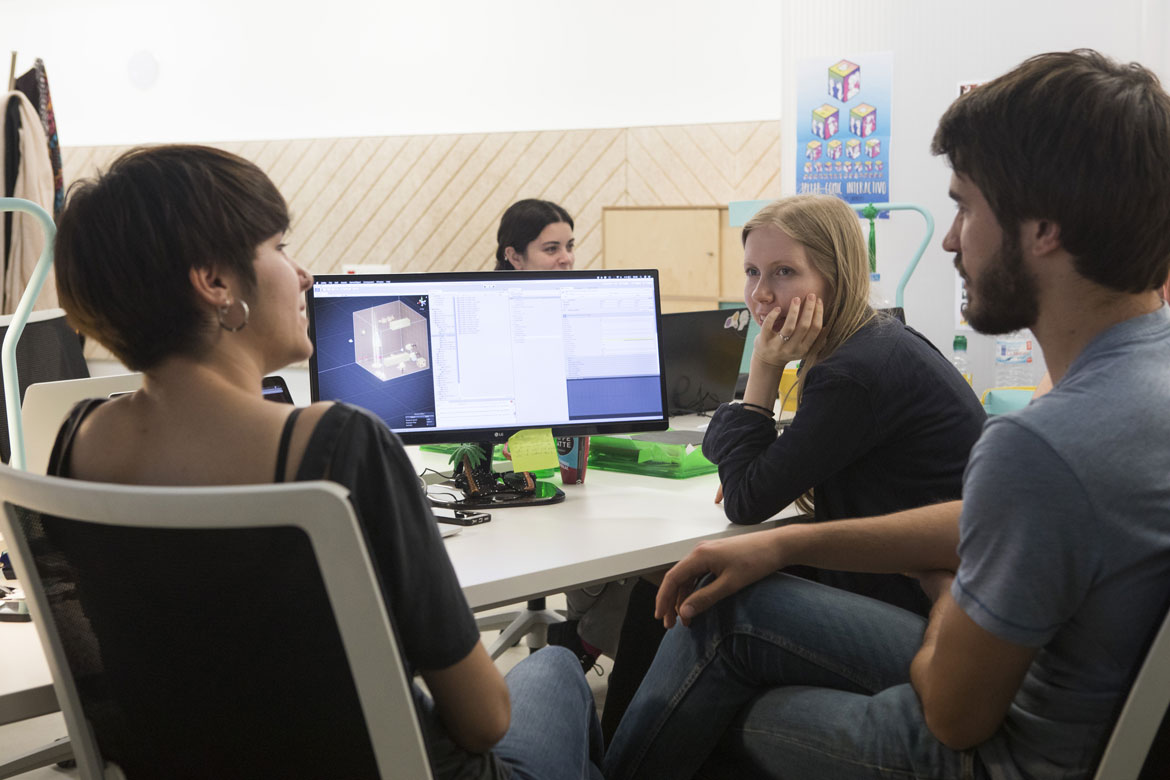
The three incubator projects have already won several awards, including a Laus Silver 2016 award and a UPC Three Headed Monkey Award (3HMA), in the Mobile category, in 2016. They have likewise been selected at shows and professional pitching sessions, such as the University-Industry Audiovisual Pitching Session.
Bachelor’s degree final projects in interactive communication are artistic and cultural digital creation projects in various formats with a predominant audiovisual component and an innovative approach to interactive media.
Bachelor’s degree final projects in interactive communication are artistic and cultural digital creation projects in various formats with a predominant audiovisual component and an innovative approach to interactive media. Some adhere to well-established formats, such as video games or cultural or educational apps, whilst others, such as interactive installations or interactive narratives, fall outside of these categories.
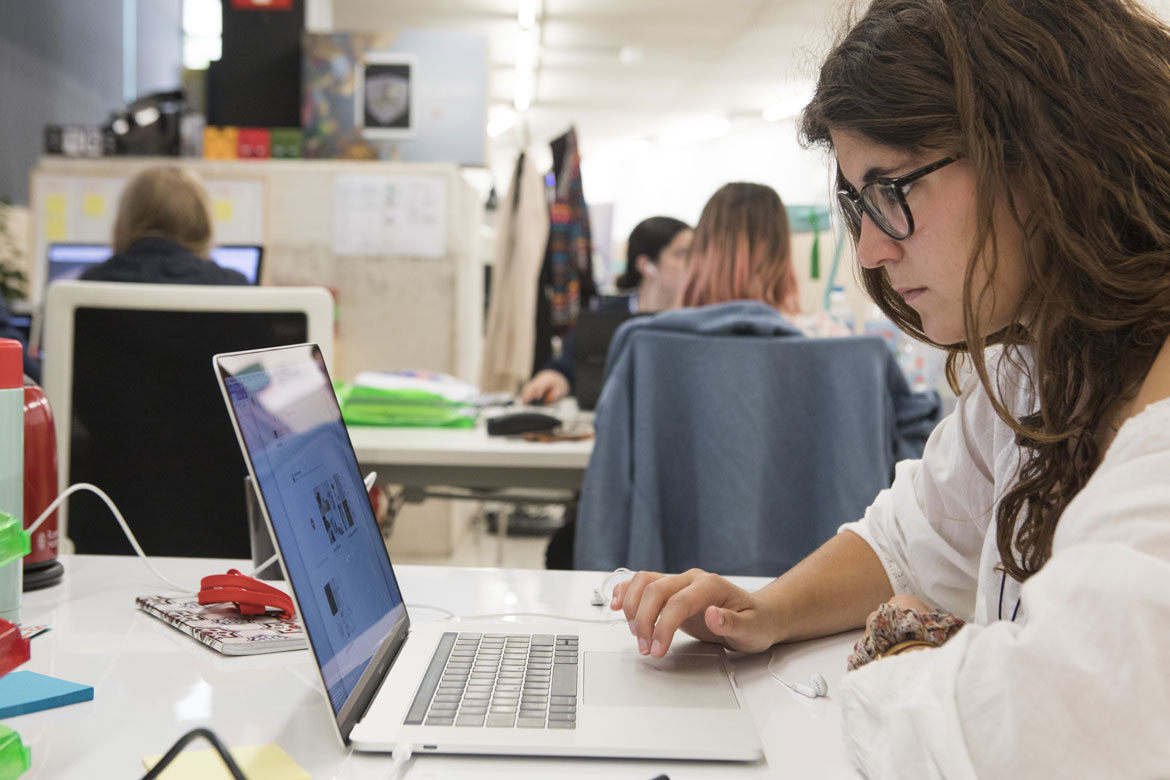
They all feature an innovative experimental, narrative or discursive component intrinsic to the degree programme in Audiovisual Communication that is not found in similar programmes. They are finished projects in the design stage that include a functional prototype that makes it possible to get an initial idea of the final product.
The projects at a glance
Authors: Marina Díaz, Cristina Prim and Ksenia Klykova (degree in Audiovisual Communication) and Guillem Galimany (engineering degree in Audiovisual Systems).
Synopsis: A video game that will make you rack your brains. Move the objects and the cube itself to guide your character through the different colourful and geometric levels. Will you be able to find the exit?
Authors: Ana Mar López, Eric Sueiro and Pilar Villanueva (degree in Audiovisual Communication) and Roser Pruaño (engineering degree in Computer Science).
Synopsis: An interactive web comic that recounts the adventures of two astronauts in a hostile environment. After six years of successfully terraforming Mars, the International Space Agency (ISA) has lost contact with the crew on the Red Planet. Its last hope is to send Lupe García and Yun Lao to figure out what happened.
Gálibo
Product: webdoc or interactive documentary
Authors: Agnès Olivé, Natàlia Morales and Raquel Pagès (degree in Audiovisual Communication) and Jorge Villanueva (engineering degree in Computer Science).
Synopsis: Interactive documentary that seeks to explore the daily life and life on the road of five lorry drivers.
